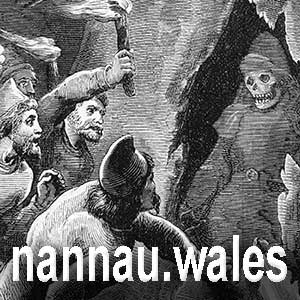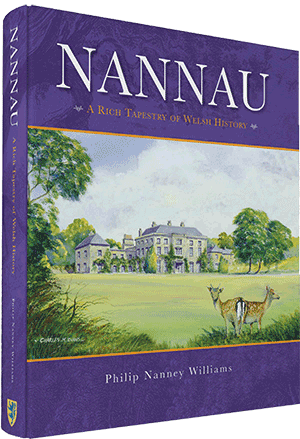[1850] The Town Now Had 11 Mills
[1850] An Old Rhyme of Dolgelley (by Thackeray). When you go to the town of Dolgelly, don't stay at the Lion Hotel, There’s nothing to put in your belly, and no one to answer the bell.
[1851] Shop Fach Eldon-square was pulled down (see c 1810 entry). Owned by Sir Robert Vaughan, it was occupied for several years by David Jones, bookbinder, a zealous and active temperance advocate
[1855] The Grammar School Headmaster eaned between £35 to £40 per annum
[1855] A committee selected to arrange for lighting and watching the town at a cost of £80 per year
[1855] Ship Hotel, with some land, was rented at £20.13 shillings (£20.65p) and The Golden Lion at £19.15 shillings (£19.75p) per year
[1862] £70,000 worth of gold sold by Clogau Gold Mine to England
[1862] The last Brigantine (Ship) was built in Penmaenpool and was the "Charlotte", Capt. Black in charge. Boats were launched broadside in Penmaenpool. Locals were employed to help launch by rocking the boat. Vast quantities of free beer were taken prior to assist in this dangerous job
[1864] St. Mary's Chancel Added
[1864] A Mr Smith, a keen walker, left Machynlleth in September to climb Cader Idris. He refused to pay a guide the 15 shillings (75p) fee to take him up and down the mountain. Night was approaching and bad weather forecasted. Against the guides' advice, Mr Smith went on alone. Six weeks passed and nothing more was ever heard of Smith. His brother came to make enquiries, but to no avail. The following May, a man's dog started barking whilst on Cader, and its owner, looking over a precipice, saw a dead body - a skeleton in clothes, having been ravaged by foxes and ravens. A knapsack found nearby confirmed the body's identity as that of Smith. He had fallen some 1300 feet
[1864] As a market town, Dolgellau paid £255 18s 6d Excise Duties for the year ended 24th June
[1865] As a market town, Dolgellau paid £256 19s 3d Excise Duties for the year ended 24th June
[1866] As a market town, Dolgellau paid £279 5s 1d Excise Duties for the year ended 24th June
[1867] As a market town, Dolgellau paid £307 9s 1d Excise Duties for the year ended 24th June.
[1868] Tabernacl Chapel Built
[1868] The Railway Arrives
[1868] Y Dydd (The Day) Newspaper First Published
[1868] The navvies working on the extension of the railway line from Bala to Dolgellau used to pour into The Old Tavern (Drws-y-nant, see entry 1817) for drinks. Attached to the the inn was a lean-to, since demolished, called Cegin-y-Gwyddelod, (The Irishmen's kitchen). This was set aside for the Irish navvies, for the Welsh refused to drink with them
[1868] The "Hen and Chickens" hotel was demolished because of the arrival of the railway. The hotel stood on the site of the old Toll House on the north side of Y Bont Fawr (also later demolished)
[1869] Charles Darwin wrote to Sir J.D. Hooker "We have a beautiful house, with a terraced garden, and a really magnificent view of Cader right opposite. Old Cader is a grand fellow, and shows himself off perfectly with every changing light". He was living at Caerdeon near Bontddu and writing his Descent of Man at the time
[1869] Dolgellau Court. Mary Thomas was found guilty of leaving her pigs to stray in Lombard Street on the 1st May. John Thomas a postman was found guilty of allowing his donkey to stray on the 5 May on the turnpike road from Dolgelley to Towyn. Both were fined 2/6 with costs, or if in default, 7 days imprisonment. They were charged with the offences by Police Constable Evans
[1870] Neuadd Idris Built
[19th Century] The Welsh Gold Rush
[c. 1870] Robert Meredith founded a light leather tannery, dealing with sheepskins (see 18th Century entry).
[1870] (March 15th) Miss Mary Owen, landlady of the Golden Goat Inn, was found not guilty of causing drunkenness at her Inn, when it could not be proved that she had knowingly supplied the accused with drink
[1870] Meredith Richards presented 19 handsome and interesting volumes for the use of inmates of the workhouse. These were in English and a number of Welsh volumes would also be supplied. He had also previously presented flower seeds for the decoration of the pasture in front of the workhouse
[1870] (12th June) Prisoner Edmund Williams alias ‘Ned of Grogwyn’, escaped from Dolgellau County Gaol. He was undertaking 18 months imprisonment for burglary. He scaled a wall and made his escape supposedly to Liverpool. He was aged 28, five to five and a half feet tall and had a speech impediment. A handsome reward was offered for his apprehension
[1871] Rev Francis Kilvert drove by omnibus from Barmouth junction to 'Miss Roberts' Hotel, The Golden Lion, Dolgelly', staying for a few days.(Kilverts Diary) (on 12th June)
[1871] Kilvert's guide on Cader Idris, a Mr Pugh told him that 'This is the highest point of Cader Idris', laying his hand on a peak of wet living rock, 'not that', pointing at a great conical pile of stones built upon the peak by sappers and miners during the Ordnance Survey 'The Captain of the surveying company had his tent pitched on the top of Cader Idris for 3 summer months and never left the place. He had 18 men to wait upon him. And how many clear views do you think he got in that time? Nine'
[1872] Mr. John Meyrick Jones, Meyrick House was given Royal Patronage for his Welsh tweeds by Her Royal Highness, The Princess of Wales
[1872] The Caernarvon and Denbigh Herald - 'CHRISTMAS DECORATIONS... The shops decorated with the greatest taste were Shop Newydd (Mr Richard Jones); Mr D.E. Hughes, draper; Mr Griffith Jones, grocer; Mr Richard Mills do; Mrs Miles & c. Several butchers displayed a fine show of Christmas meat, and that the window of Mr Edward Jones was of a very superior character'.
[1873] A visitor wrote 'No visitor should visit Dolgellau without seeing the primitive way flannels and tweeds are made'.
[1875] Tolls into Dolgellau abolished. From a slate on one of the old toll houses on the road from Bala. 'Every Horse or other Beast drawing any Coach, Chariot, Chair with four wheels 6d (2.5p), For every other Horse or Beast drawing any wagon with four or two wheels 4d (2p), For Every Horse or other Beast laden or unladen and not drawing 1.5d (1p); For every drove of Oxen, Cows or Meat Cattle per score and so in proportion for any less number 10d (4p). For every drove of Calves, Hogs, Sheep, Lambs or Goats per score and so in proportion for any less number 5d (2p)
[1875] The town's fire engine was almost unserviceable when called upon to deal with a small fire at The Red Lion, the last time it was used. Previously used by 'the waterman and the local board officers' to water the streets of the town during very dry weather
[1875] Gerard Manley Hopkins (Jesuit Priest & Poet) reputedly wrote the poem Penmaen Pool about 1875 in the visitors book at the George III Hotel
[1877] Cadwalader Jones of Parc Farm was the Last Person to be Hanged in Dolgellau for the Murder of Sarah Hughes (Took Place on 23rd November
[1877] Eglwys Bethel (M.C.) built. (M.C. is Welsh for Calvinistic Methodists)
[1878] Dr. Williams School for Girls Established
[1879] Penmaenpool Tollbridge Built Across the Mawddach which replaced 24 hour (one man power) ferry service across the river. The ferry service was still going in May 1892. The bridge had to have a large centre span (30 foot) should there be a resurgence of the boat building trade at Maes Y Garnedd, Llanelltyd and a seagoing vessel need to pass through
[1880] Ebenezer Chapel Built
[c.1880] Dolgellau woollen export trade creates shipbuilding industry on the Mawddach. Produce taken by packhorse from Dolgellau to Llanelltyd, then on to Barmouth by Sloop for transportation to Liverpool. Exporting to South Carolina, Africa, Germany Holland. British Army fought in Dolgellau woollen clothes
[1881] Cwrt Plas yn Dre (Old Parliament House) Demolished. Cambrian News November: 'The Old Parliament house was bought by Mr Thomas Roberts, ironmonger, Bank Buildings, for the purpose of erecting new business premises. One of the greatest attractions in Dolgelley is gone , and no business convenience will ever repay the loss'. It was rebuilt at Milford Road, Newtown, where it is currently a Quaker Friends Meeting House
[1881] May - Cambrian News - the house of Mr Evan James, mason, took fire. The river Arran and mill stream... supplying an abundance of water... the fire was soon put out. Its close proximity to a large block of buildings consisting of Y Dydd Printing Office, The Unicorn and Talbot hotels... (had the fire spread)... a large portion of the town would have been in imminent danger
[1881] January 14th - Cambrian News - 'TOWN IMPROVEMENT - At last the old houses at the top of Eldon-square, the property of Mr Jones, of Glandwr, are being pulled down.... the thickness of the wall of the gable-end, including the chimney was seven feet'.
[1881] Dr Williams Schools' Principal Head Teacher was Emily Armstrong, a 35 year old spinster from Middlesex. Ellen Pritchard (29) from Islington and Eliza Cowell (38) of Newcastle were Governesses. Mary Tritton (18) was the only other pupil teacher. The school had 19 boarders, a cook, housemaid, kitchenmaid and laundress
[1881] Richard Willams (37) was the town's Postmaster. The Post Office was also a draper's shop. Assistants there were Taliesin F. Williams (19), William Pugh (18) and William Powell (17)
[1881] Dolgelley Union Workhouse had, as its Municipal Workhouse Master, William Williams residing there with his wife Dorothy and sons Griffith and Edward. Evan Williams was the Workhouse Task Master, with Sarah Jones a domestic worker and Anne Evans the Workhouse nurse. It contained 58 pauper inmates, the oldest being 81 year old Lewis Pugh, an Agricultural worker, and 1 month old Hugh Williams, son of Gwen Williams, the youngest. The Workhouse had the following handicaps recorded against some of the paupers; 'idiots' 7, 'imbeciles' 6, and 1 'lunatic'
[1886] T.H. Roberts Built
[1890] The 13th Century Silver Guilt Chalice and Paten from Cymmer Abbey were Found Hidden Under a Stone in Cym-y-mynach
[1891] The Gossiping Guide To Wales was Published
[1893] Salem Chapel Built
[1894] Gill's Imperial Geography ; WALES; INDUSTRIES: Dolgelley, Welshpool and Newtown make flannels and blankets
[1895] The Provincial Eisteddfod was held at Dolgellau on the 16th and 17th August. These were getting common in Wales since the National Eisteddfod was suspended. Special praise was given to committee secretaries, Rev John Jones of Rhydymain, and Mr Lewis Williams, an auctioneer in Dolgelley





